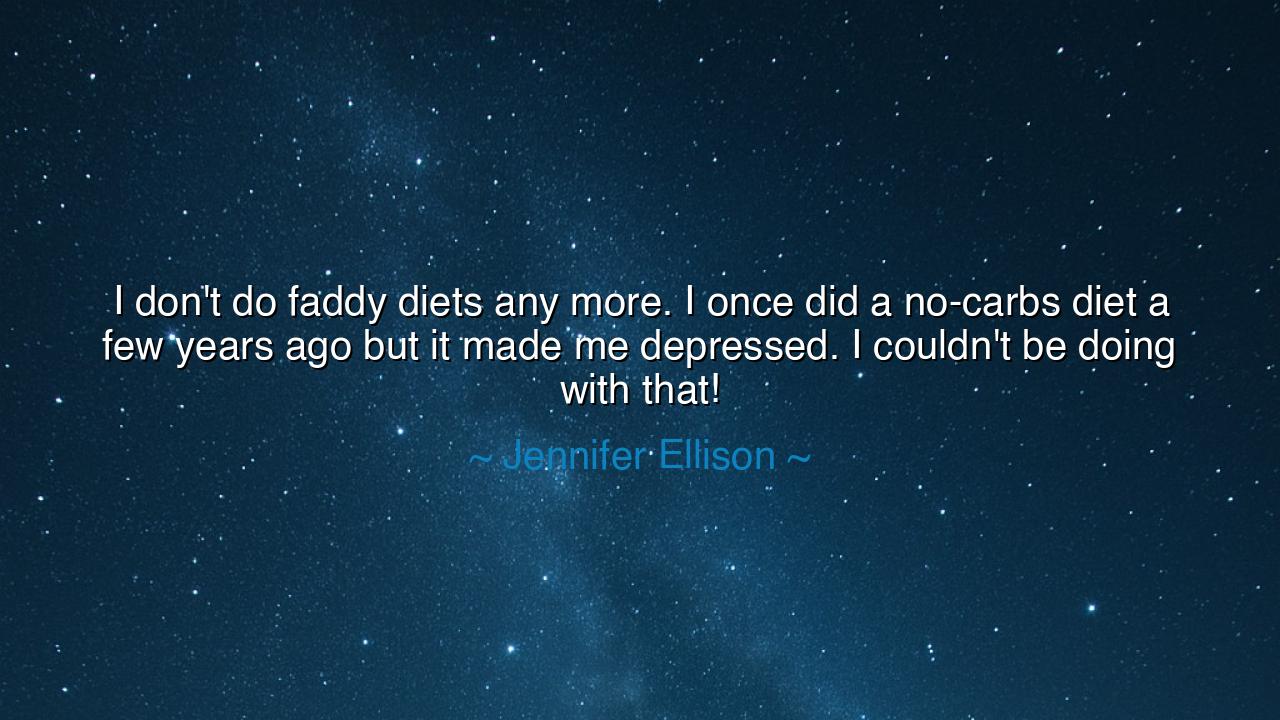
I don't do faddy diets any more. I once did a no-carbs diet a few
I don't do faddy diets any more. I once did a no-carbs diet a few years ago but it made me depressed. I couldn't be doing with that!






In the candid words of Jennifer Ellison, we find a quiet yet powerful revelation about the nature of balance and the perils of excess: “I don’t do faddy diets any more. I once did a no-carbs diet a few years ago but it made me depressed. I couldn’t be doing with that!” Though spoken simply, her confession carries the tone of wisdom earned through trial. Beneath the humor and casualness of her words lies the truth of an ancient principle—that all extremes, however noble they may appear, lead not to harmony but to imbalance. Hers is the voice of one who has tasted deprivation in pursuit of perfection and has chosen, instead, the middle path of wholeness.
The faddy diet, like so many modern illusions, promises transformation through denial. It seduces with the dream of quick results, of mastery over the body through control and restriction. Yet Ellison’s rejection of these fleeting trends speaks to a deeper understanding: that the human spirit is not sustained by discipline alone, but by joy, balance, and nourishment—both of body and of soul. To live well, she reminds us, is not to live by fads or fear, but to live by awareness. She has learned, as the ancients taught, that to treat the body as an enemy is to invite sorrow into the heart.
When she speaks of becoming depressed on the “no-carbs diet,” her words carry more than a tale of discomfort—they reveal the cost of severing oneself from life’s natural rhythm. The ancients knew that food was more than sustenance—it was communion, a bond between the body and the earth. To remove from one’s table entire portions of what nature provides is to declare war against the very design of creation. Hippocrates, the father of medicine, once said, “Let food be thy medicine and medicine be thy food.” But he also warned that even medicine, when taken without measure, becomes poison. In the same way, Ellison’s journey through the no-carb regimen becomes a parable of moderation: the realization that health without happiness is a hollow victory.
Her words echo the timeless wisdom of the Middle Way, taught by Siddhartha Gautama, who became the Buddha. After years of extreme fasting and self-denial in his quest for enlightenment, the young ascetic found himself weak, joyless, and near death. Then, one day, a village girl offered him a bowl of rice. In that simple act, he awakened to the truth that the body and the spirit must coexist in harmony—that the path to wisdom is not through suffering, but through balance. Ellison’s story mirrors this same awakening in a modern form. She, too, learned that joy and vitality cannot flourish in deprivation, that true strength lies in kindness toward oneself.
When she declares, “I couldn’t be doing with that!” she speaks with the clarity of someone who has cast off the illusions of vanity and chosen instead the freedom of self-acceptance. There is humor in her tone, but also a quiet triumph—the victory of self-knowledge over self-punishment. It is the same kind of laughter that comes from those who have walked through the desert of extremes and found peace in the oasis of moderation. She no longer seeks perfection in the mirror or control in the diet; instead, she seeks contentment, which is the foundation of enduring health.
Her story also warns us of the subtle tyranny of trends—the endless cycle of fads that promise fulfillment but leave the spirit empty. The ancients would have called this the folly of chasing shadows. For each new promise, each new “miracle cure,” only feeds the hunger of insecurity. To live by such trends is to become a servant of fashion rather than a student of truth. Ellison’s rejection of these false paths is, therefore, an act of wisdom—a turning away from the noise of the world toward the still voice within that says, “This is enough.”
And so, the lesson she offers is as enduring as it is gentle: seek balance, not extremes. Eat with mindfulness, but do not let food become your master. Care for the body, but do not starve the soul. Let every meal be a small act of gratitude—for what nourishes the body also nourishes the heart when taken in joy. If you are to follow a diet, let it be the diet of moderation, kindness, and awareness.
Thus, Jennifer Ellison’s simple reflection becomes a teaching worthy of the philosophers: that health is not found in denial, but in harmony. To live well is to honor both discipline and delight, both nourishment and need. For when we learn to feed ourselves with balance—through food, through rest, through love—we find what no fad can ever offer: the radiant peace of a life fully and joyfully lived.






AAdministratorAdministrator
Welcome, honored guests. Please leave a comment, we will respond soon